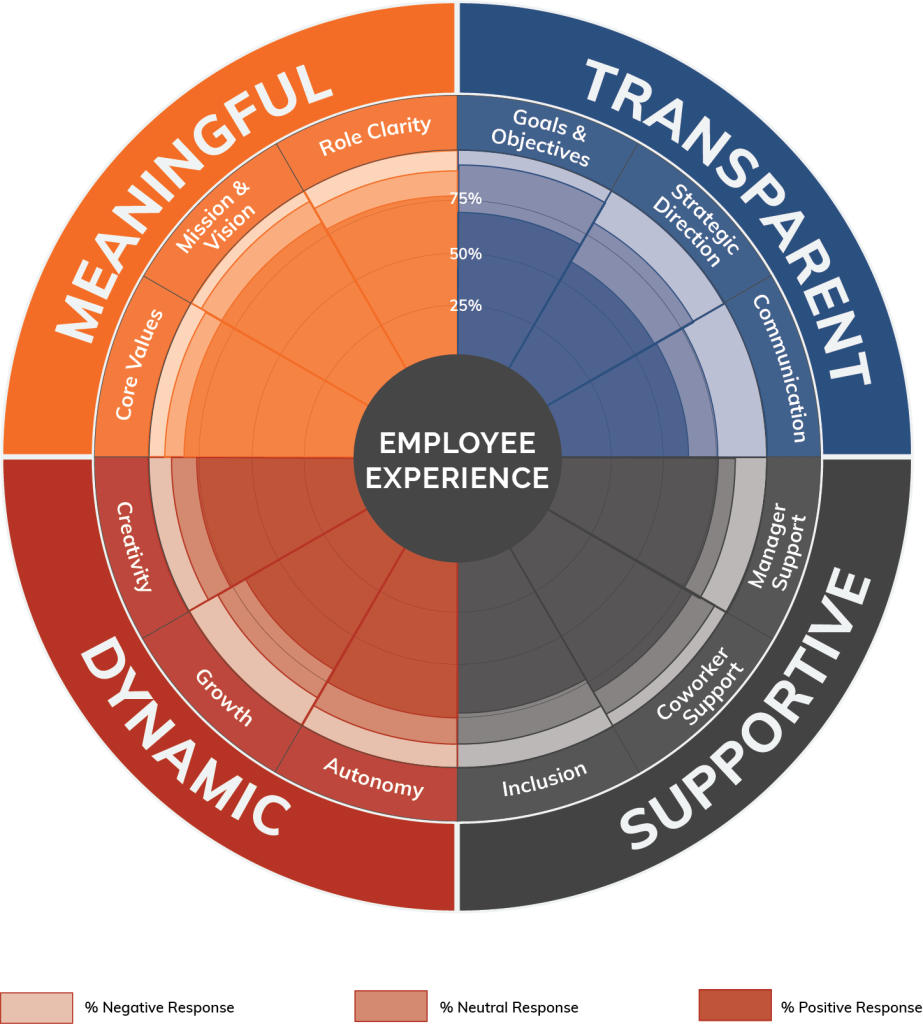Realize Employee Experience Survey Insights: What We Learned in 2022
Published on October 11, 2022
Driving workplace change starts with listening to our people.
In early 2022, we heard from 281 employees working at five purpose-driven organizations in BC who participated in the first annual Realize Employee Experience Survey. These organizations ranged in size from 20 to 500 people and were primarily non-profit organizations. Using the Realize Employee Experience Framework, participating organizations received detailed reports comparing their organizations with the averages for the other participating organizations.

Key insights
1. Communication is highly important and most in need for improvement
Participants rated communication as the most important area affecting their employee experience. However, it was also the area which had the most room for improvement. Pre-existing communication issues were likely worsened during the past few years of continuous workplace changes thanks to the pandemic and other factors.
Take action
- To improve communication and improve the employee experience, leaders need to be more transparent with employees, explain why decisions are made, and solicit feedback and ideas from all employees in meaningful ways. Next week’s article will provide a deeper dive into how to strengthen the employee experience through communication.
Co-worker support requires a foundation of psychological safety to have the most impact
Having good cooperation, trust, and respect with coworkers was a strength for participating organizations and had a protective effect against experiencing burnout at work. As we navigate changes in the workplace like hybrid or remote work, leaders need to intentionally create opportunities for employees to collaborate and get to know each other in genuine ways. One key takeaway from the survey was employees need more support from managers on how to navigate conflict with their coworkers.
Take action
- Provide training to your managers and staff on how to conduct respectful conversations for difficult topics.
- Along with adapting their leadership for the evolving workplace, leaders need to intentionally create space and opportunities for employees to collaborate and get to know each other in genuine ways.
3. Inclusion is highly important to the employee experience
Establishing and nurturing an inclusive workplace culture where employees feel comfortable bringing their whole selves to work, are able to voice differing opinions and feel their perspectives are included, and have their ideas received well by leaders, all support greater engagement and job satisfaction as well as reduced job anxiety and burnout. These all require a strong sense of psychological safety which leaders can foster by actively listening,
Take action
- Provide your managers and leadership with training on what psychological safety is, how to establish psychologically safe workplaces, and how to foster active and transparent communication.
4. Managers impact positive employee experience through reliability and availability
There’s a common saying that “people leave managers, not companies.” Gallup reported that managers account for at least 70% of variance in employee engagement scores and data from DDI’s Frontline Leader’s Project revealed that 57% of people have left a job to get away from a bad manager. In our survey, manager support was a driver of increased engagement and satisfaction and decreased job anxiety and burnout. In order to have a positive employee experience, people need to be able to rely on their manager(s) for support and feel comfortable going to them with questions or problems. Employees should also be able to rely on their manager to provide timely, clear feedback.
Take action
- The support employees want to see from their managers include:
- Prompt responses and quick actions
- Onsite visits and involvement
- Consistent check-ins
- Active listening
- Respecting work-life boundaries and encouraging self-care
- This support is particularly needed during periods of high workloads, and should incorporate more frequent positive feedback, recognition, and appreciation.
5. Growth is more than a new job title
Growth in relation to the overall employee experience involves establishing a learning culture where mistakes are viewed as learning opportunities. This can start with leaders showing vulnerability by admitting to their own mistakes and creating spaces where others feel that it’s ok to share and learn from each other’s mistakes as well as ask for help without the fear of job loss. Employees also desire clarity on how they can grow and develop in their roles as well as how they can advance their careers. Having a strong Growth score within an organization can drive employee job satisfaction and also reduce job anxiety and burnout.
Take action
- Leaders can establish learning cultures where mistakes are viewed as learning opportunities and model vulnerability by admitting to their own mistakes.
- Provide staff clarity around role growth by offering more training opportunities, more challenges within roles (when appropriate given workloads), as well as internal mentoring or exchanging experience with other employees.



